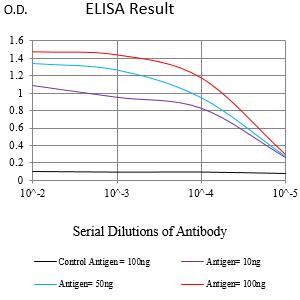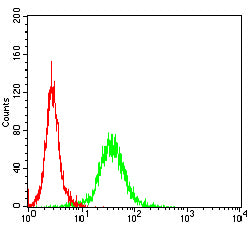

| WB | 咨询技术 | Human,Mouse,Rat |
| IF | 咨询技术 | Human,Mouse,Rat |
| IHC | 咨询技术 | Human,Mouse,Rat |
| ICC | 技术咨询 | Human,Mouse,Rat |
| FCM | 1/200 - 1/400 | Human,Mouse,Rat |
| Elisa | 1/10000 | Human,Mouse,Rat |
| Aliases | IMD79; OKT4D; CD4mut |
| Entrez GeneID | 920 |
| clone | 3A12A5 |
| WB Predicted band size | 51kDa |
| Host/Isotype | Mouse IgG2b |
| Antibody Type | Primary antibody |
| Storage | Store at 4°C short term. Aliquot and store at -20°C long term. Avoid freeze/thaw cycles. |
| Species Reactivity | Human |
| Immunogen | Purified recombinant fragment of human CD4 (AA: 26-170) expressed in E. Coli. |
| Formulation | Purified antibody in PBS with 0.05% sodium azide |
+ +
以下是关于CD4抗体的3篇代表性文献及其摘要内容的简要整理:
1. **文献名称**:*Structural basis of the CD4-CXCR4 HIV entry inhibitor assembly*
**作者**:Zhu P, Liu J, Bess J Jr, et al.
**摘要**:该研究通过冷冻电镜解析了CD4抗体与HIV包膜蛋白gp120及CXCR4受体结合的复合物结构,揭示了CD4抗体如何阻断病毒与宿主细胞膜融合的分子机制,为抗HIV药物设计提供了结构基础。
2. **文献名称**:*CD4 antibodies in the treatment of autoimmune diseases*
**作者**:Bielekova B, Richert N, Herman ML, et al.
**摘要**:探讨了抗CD4单克隆抗体在治疗多发性硬化症等自身免疫疾病中的潜力,发现其可通过调节T细胞功能减轻炎症反应,但长期使用可能导致免疫抑制风险增加。
3. **文献名称**:*HIV-1 broadly neutralizing antibody precursor B cells revealed by germline-targeting immunogen*
**作者**:Steichen JM, Kulp DW, Tokatlian T, et al.
**摘要**:研究了靶向CD4结合位点的广谱中和抗体(如VRC01类抗体)的前体B细胞,提出通过特定免疫原设计可激活这类抗体产生,为HIV疫苗开发提供新策略。
4. **文献名称**:*CD4-directed CAR T cells in cancer immunotherapy*
**作者**:Mamonkin M, Brenner MK.
**摘要**:报道了一种以CD4为靶点的CAR-T细胞疗法,通过选择性清除肿瘤微环境中免疫抑制性CD4+ T细胞,增强抗肿瘤免疫应答,在动物模型中显示出显著疗效。
这些研究覆盖了CD4抗体在病毒学、自身免疫病治疗及肿瘤免疫治疗等领域的应用和机制探索。
CD4 antibodies are essential tools in immunology, primarily targeting the CD4 glycoprotein expressed on the surface of helper T cells, regulatory T cells, monocytes, macrophages, and dendritic cells. The CD4 molecule serves as a co-receptor for the T-cell receptor (TCR), stabilizing interactions between TCRs and major histocompatibility complex class II (MHC II) molecules on antigen-presenting cells. This interaction is critical for T-cell activation and adaptive immune responses.
Monoclonal CD4 antibodies, such as OKT4 and Leu-3a, are widely used in research and diagnostics to identify and isolate CD4+ T cells. These antibodies bind to distinct epitopes on the CD4 extracellular domain. Some CD4 antibodies act as agonists, inducing T-cell signaling, while others block CD4-MHC II interactions, suppressing immune activation. This dual functionality makes them valuable for studying immune regulation and developing therapies.
Clinically, CD4 antibodies have therapeutic potential. Anti-CD4 monoclonal antibodies like ibalizumab are approved for HIV treatment, blocking viral entry by targeting the CD4 receptor. In autoimmune diseases, CD4-targeted therapies aim to modulate pathogenic T-cell activity. However, prolonged CD4 blockade may risk immunosuppression, necessitating careful dosing.
CD4 antibodies also play roles in cancer immunotherapy, either by depleting regulatory T cells to enhance anti-tumor responses or by engineering bispecific antibodies to redirect T cells against tumors. Their versatility underscores their importance in both basic research and translational medicine.
×